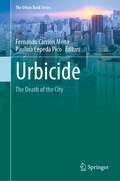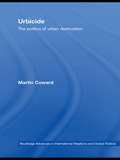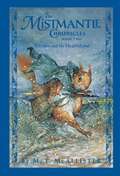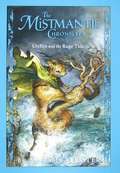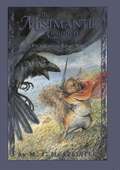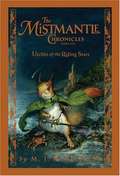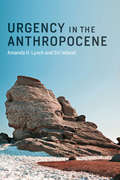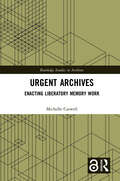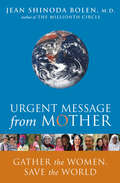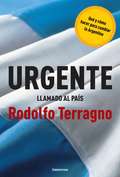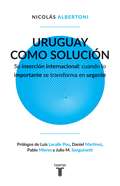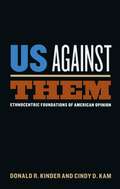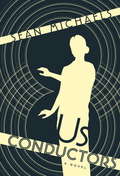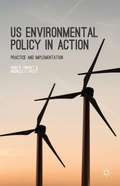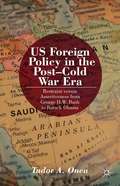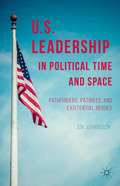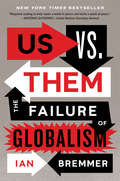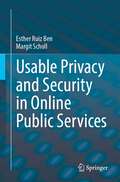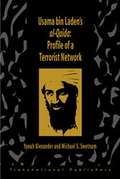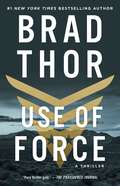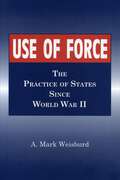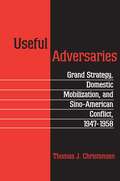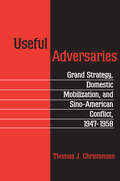- Table View
- List View
Urbicide: The Death of the City (The Urban Book Series)
by Fernando Carrión Mena Paulina Cepeda PicoThis book uses the reflection of academics specialized in the urban area of Latin America, Europe and the United States, to initiate a comparative debate of the different dynamics in which Urbicidio expresses itself. The field or focal point of analysis that this publication approaches is the city, but under a new critical perspective of inverse methodology to that has been traditional used. It is about understanding the structural causes of self-destruction to finally thinking better and then going from pessimism to optimism.It is a deep look at the city from an unconventional entrance, because it is about knowing and analyzing what the city loses by the action deployed by own urbanites, both in the field of its production and in the field of its consumption. This suppose that the city does not have an ascending linear sequential evolution in its development but neither in each of its parts in the improvement process, showing the face that commonly not seen but others live. The category used for this purpose is that of Urbicidio or the death of the city, which contributes theoretically and methodologically to the knowledge of the city, as well as to the design of urban policies that neutralize it. In addition, it is worth mentioning that the book has an inclusive view of the authors. For this reason, gender parity, territorial representation and the presence of age groups have been sought.
Urbicide: The Politics of Urban Destruction (Routledge Advances in International Relations and Global Politics #66)
by Martin CowardThe term ‘urbicide’ became popular during the 1992-95 Bosnian war as a way of referring to widespread and deliberate destruction of the urban environment. Coined by writers on urban development in America, urbicide captures the sense that the widespread and deliberate destruction of buildings is a distinct form of violence. Using Martin Heidegger’s notion of space and Jean-Luc Nancy’s idea of community, Martin Coward outlines a theoretical understanding of the urban condition at stake in such violence. He contends that buildings are targeted because they make possible a plural public space that is contrary to the political aims of ethnic-nationalist regimes. Illustrated with reference to several post-Cold War conflicts – including Bosnia, Chechnya and Israel/Palestine – this book is the first comprehensive analysis of organised violence against urban environments. It offers an original perspective to those seeking to better understand urbanity, political violence and the politics of exclusion.
Urchin and the Heartstone (The Mistmantle Chronicles, #2)
by M. I. McAllisterUrchin of the Riding Stars has taken his place as a trusted member of the Circle in King Crispin's court. Life on the island is back to normal but is disrupted when Lord Arcneck and other people of Swan Isle come to Mistmantle asking for help.
Urchin and the Rage Tide (The Mistmantle Chronicles, #5)
by M. I. McAllisterThe animals must brave a series of tidal waves that threaten their island. During the disaster, a squirrel named Mossberry plots to take over the kingdom. And on top of that, Sepia has gone missing! It's up to Urchin and Corr to save everyone and bring peace.
Urchin and the Raven War (The Mistmantle Chronicles, #4)
by M. I. McAllisterUrchin has taken his place as a member of the Circle in King Crispin's court. Life on the island is back to normal-- until Lord Arcneck and other inhabitants of Swan Isle come to Mistmantle for help after bloodthirsty ravens take over their home.
Urchin of the Riding Stars (The Mistmantle Chronicles, #1)
by M. I. McAllisterA tiny squirrel is found abandoned and close to death on a distant beach. Adopted and raised by a kindly squirrel, Urchin has no idea of his powerful destiny or of the way he will influence the island of Mistmantle.
Urgency in the Anthropocene
by Amanda H. Lynch Siri VelandA proposal to reframe the Anthropocene as an age of actual and emerging coexistence with earth system variability, encompassing both human dignity and environmental sustainability. Is this the Anthropocene, the age in which humans have become a geological force, leaving indelible signs of their activities on the earth? The narrative of the Anthropocene so far is characterized by extremes, emergencies, and exceptions—a tale of apocalypse by our own hands. The sense of ongoing crisis emboldens policy and governance responses that challenge established systems of sovereignty and law. The once unacceptable—geoengineering technology, for example, or authoritarian decision making—are now anticipated and even demanded by some. To counter this, Amanda Lynch and Siri Veland propose a reframing of the Anthropocene—seeing it not as a race against catastrophe but as an age of emerging coexistence with earth system variability. Lynch and Veland examine the interplay between our new state of ostensible urgency and the means by which this urgency is identified and addressed. They examine how societies, including Indigenous societies, have understood such interplays; explore how extreme weather and climate weave into the Anthropocene narrative; consider the tension between the short time scale of disasters and the longer time scale of sustainability; and discuss both international and national approaches to Anthropocene governance. Finally, they argue for an Anthropocene of coexistence that embraces both human dignity and sustainability.
Urgent Archives: Enacting Liberatory Memory Work (Routledge Studies in Archives)
by Michelle CaswellUrgent Archives argues that archivists can and should do more to disrupt white supremacy and hetero-patriarchy beyond the standard liberal archival solutions of more diverse collecting and more inclusive description. Grounded in the emerging field of critical archival studies, this book uncovers how dominant western archival theories and practices are oppressive by design, while looking toward the the radical politics of community archives to envision new liberatory theories and practices. Based on more than a decade of ethnography at community archives sites including the South Asian American Digital Archive (SAADA), the book explores how members of minoritized communities activate records to build solidarities across and within communities, trouble linear progress narratives, and disrupt cycles of oppression. Caswell explores the temporal, representational, and material aspects of liberatory memory work, arguing that archival disruptions in time and space should be neither about the past nor the future, but about the liberatory affects and effects of memory work in the present. Urgent Archives extends the theoretical range of critical archival studies and provides a new framework for archivists looking to transform their practices. The book should also be of interest to scholars of archival studies, museum studies, public history, memory studies, gender and ethnic studies and digital humanities.
Urgent Message from Mother: Gather the Women, Save the World
by Jean Shinoda Bolen&“This is the most inspiring and optimistic book I&’ve read in years. It tells how women working together can bring us peace and save the planet.&”—Isabel Allende Jean Shinoda Bolen&’s unique combination of visionary thinking and practical how-to seeks to galvanize the power of women acting together in order to save our world. Bolen outlines the lessons we can learn from the women&’s movement, draws on Jungian psychology and the sacred feminine, and gives powerful examples of women coming together all over the globe to make a significant impact. Her life&’s work—which includes her Jungian-inspired insights in The Tao of Psychology, her bestseller Goddesses in Every Woman, Crones Don&’t Whine, and The Millionth Circle—culminates in this timely book, Urgent Message from Mother. &“A book whose time has come. Our earth home and all forms of life in it are at grave risk. We men have had our turn and made a proper mess of things. We need women to save us. I pray that many will read Bolen&’s work and be inspired then to act appropriately. Time is running out.&”—Desmond Tutu &“Always urging us into circle and into peace, the healing power of Jean Shinoda Bolen&’s work and thought transforms all who will allow encounter. Jean never tires of wanting, and working for, our freedom, our healing and our health.&”—Alice Walker &“Jean Shinoda Bolen shows us how the cult of masculinity is endangering us all. Women and men are equally human and fallible but at least women don&’t have our masculinity to prove—and that alone may make us the main saviors of this fragile Spaceship Earth.&”—Gloria Steinem
Urgente llamado al país: Qué y cómo hacer para cambiar la Argentina
by Rodolfo TerragnoTerragno asegura con el aval de un enorme caudal de documentación, quees perfectamente posible una Argentina más próspera y menos injusta, mássegura y menos confusa. Un país con una economía desarrollada a pleno,educación masiva de calidad y sin marginados. Seis años fueron suficientes, en el siglo XX, para que, de la nada,nuestros antepasados construyeran una nación. En un período similar,sostiene Rodolfo Terragno en este libro -cuyo título es pertinente comopocos-, se puede lograr algo semejante: que la Argentina pase de ser unpaís sin ilusiones a uno de esperanzas renovadas.Para eso, el autor propone acuerdos amplios sobre las políticas deEstado que define con precisión. Dedica varias páginas a demostrar que,pese a una historia de turbulencias, la nación se construyó y desarrollómerced a pactos que, antes de celebrarse, parecían imposibles.
Uruguay como solución: Su inserción internacional: cuando lo importante se transforma en urgente
by Nicolas Albertoni¿Cuáles son las oportunidades y desafíos que presenta el mundo actual para Uruguay? Nicolás Albertoni explica las claves de la inserción internacional que el país tiene por delante y porqué es un asunto de urgencia nacional. Con prólogos de Luis Lacalle Pou, Daniel Martínez, Pablo Mieres y Julio María Sanguinetti. ¿Qué pasaría en Uruguay si moviéramos el eje de la discusión abocándola a buscar soluciones en vez de simplemente opinar sobre nuestros problemas? ¿Cuánto habríamos avanzado como país hacia el desarrollo? En este libro Nicolás Albertoni toma como punto de partida la inserción internacional del país para contribuir a un debate orientado a las soluciones. Un país que no está en contacto económico, comercial y político permanente con el mundo no se interpela a sí mismo y tiene a comparaciones facilistas que no lo alientan a crecer.
Us Against Them: Ethnocentric Foundations of American Opinion
by Donald R. Kinder Cindy D. KamEthnocentrism--our tendency to partition the human world into in-groups and out-groups--pervades societies around the world. Surprisingly, though, few scholars have explored its role in political life. Donald Kinder and Cindy Kam fill this gap with Us Against Them, their definitive explanation of how ethnocentrism shapes American public opinion. Arguing that humans are broadly predisposed to ethnocentrism, Kinder and Kam explore its impact on our attitudes toward an array of issues, including the war on terror, humanitarian assistance, immigration, the sanctity of marriage, and the reform of social programs. The authors ground their study in previous theories from a wide range of disciplines, establishing a new framework for understanding what ethnocentrism is and how it becomes politically consequential. They also marshal a vast trove of survey evidence to identify the conditions under which ethnocentrism shapes public opinion While ethnocentrism is widespread in the United States, the authors demonstrate that its political relevance depends on circumstance. Exploring the implications of these findings for political knowledge, cosmopolitanism, and societies outside the United States, Kinder and Kam add a new dimension to our understanding of how democracy functions.
Us Conductors
by Sean MichaelsThe New Face of Fiction for 2014, Us Conductors is a beautiful, haunting, brilliant novel inspired by the true life and loves of the Russian scientist, inventor and spy Lev Termen--creator of the theremin. In a finely woven series of flashbacks and correspondence, Us Conductors takes us from the glitz and glam of New York in the 1930s to the gulags and scientific camps of the Soviet Union. Lev Termen is imprisoned on a ship steaming its way from New York City to the Soviet Union. He is writing a letter to his "one true love," Clara Rockmore, the finest theremin player in the world. From there we learn Termen's story: his early days as a scientist in Leningrad, and the acclaim he received as the inventor of the theremin, eventually coming to New York under the aegis of the Russian state. There he stays, teaching eager music students, making his name, and swiftly falling in love with Clara. But it isn't long until he has fallen in with Russian spooks, slipping through the shadows of a budding Cold War, with cold-blooded results. The novel builds to a crescendo as Termen returns to Russia, where he is imprisoned in a Siberian gulag and later brought to Moscow, tasked with eavesdropping on Stalin himself. Us Conductors is a book of longing and electricity. Like Termen's own life, it is steeped in beauty, wonder and looping heartbreak. How strong is unrequited love? What does it mean when it is the only thing keeping you alive? This sublime debut inhabits the idea of invention on every level, no more so than in its depiction of Termen's endless feelings for Clara--against every realistic odd. For what else is love, but the greatest invention of all?From the Trade Paperback edition.
Us Conductors
by Sean MichaelsWinner of the 2014 Scotiabank Giller PrizeA beautiful, haunting novel inspired by the true life and loves of the famed Russian scientist, inventor and spy Lev Termen – creator of the theremin.Us Conductors takes us from the glamour of Jazz Age New York to the gulags and science prisons of the Soviet Union. On a ship steaming its way from Manhattan back to Leningrad, Lev Termen writes a letter to his “one true love”, Clara Rockmore, telling her the story of his life. Imprisoned in his cabin, he recalls his early years as a scientist, inventing the theremin and other electric marvels, and the Kremlin’s dream that these inventions could be used to infiltrate capitalism itself. Instead, New York infiltrated Termen – he fell in love with the city’s dance clubs and speakeasies, with the students learning his strange instrument, and with Clara, a beautiful young violinist. Amid ghostly sonatas, kung-fu tussles, brushes with Chaplin and Rockefeller, a mission to Alcatraz, the novel builds to a crescendo: Termen’s spy games fall apart and he is forced to return home, where he’s soon consigned to a Siberian gulag. Only his wits can save him, but they will also plunge him even deeper toward the dark heart of Stalin’s Russia.Us Conductors is a book of longing and electricity. Like Termen’s own life, it is steeped in beauty, wonder and looping heartbreak. How strong is unrequited love? What does it mean when it is the only thing keeping you alive? This sublime debut inhabits the idea of invention on every level, no more so than in its depiction of Termen’s endless feelings for Clara – against every realistic odd. For what else is love, but the greatest invention of all?“Michaels’ book is based on the life of Lev Termen, the Russian-born inventor of the Theremin, the most ethereal of musical instruments. As the narrative shifts countries and climates, from the glittery brightness of New York in the 1920s to the leaden cold of the Soviet Union under Stalin, the grace of Michaels’s style makes these times and places seem entirely new. He succeeds at one of the hardest things a writer can do: he makes music seem to sing from the pages of a novel.”—Giller Prize Jury Citation
Us Environmental Policy In Action
by Sara R. Rinfret Michelle C. PautzUS Environmental Policy provides a comprehensive look at the creation, implementation, and evaluation of environmental policy, which is of particular importance in an era of congressional gridlock.
Us Foreign Policy In The Post–cold War Era
by Tudor A. OneaWhy has the US proven unable to enact a foreign policy of restraint in the post-Cold War era? For all but a brief period in the 1990s, US foreign policy is marked by an assertive appearance despite relative hegemony. This book examines the causes and impact of US foreign policy - measuring its successes, pitfalls, and what the future has in store.
Us Leadership In Political Time And Space
by Jon JohanssonSpanning the history of American leadership, the book examines all facets of American thought leaders and innovators along with the models of ethics and courage they've provided for the American consciousness. From Thomas Paine to Rosa Parks, the book provides a multi-faceted approach to American leadership studies.
Us vs. Them: The Failure of Globalism
by Ian Bremmer"A cogent analysis of the concurrent Trump/Brexit phenomena and a dire warning about what lies ahead...a lucid, provocative book." --Kirkus Reviews Those who championed globalization once promised a world of winners, one in which free trade would lift all the world's boats, and extremes of left and right would give way to universally embraced liberal values. The past few years have shattered this fantasy, as those who've paid the price for globalism's gains have turned to populist and nationalist politicians to express fury at the political, media, and corporate elites they blame for their losses. The United States elected an anti-immigration, protectionist president who promised to "put America first" and turned a cold eye on alliances and treaties. Across Europe, anti-establishment political parties made gains not seen in decades. The United Kingdom voted to leave the European Union.And as Ian Bremmer shows in this eye-opening book, populism is still spreading. Globalism creates plenty of both winners and losers, and those who've missed out want to set things right. They've seen their futures made obsolete. They hear new voices and see new faces all about them. They feel their cultures shift. They don't trust what they read. They've begun to understand the world as a battle for the future that pits "us" vs. "them." Bremmer points to the next wave of global populism, one that hits emerging nations before they have fully emerged. As in Europe and America, citizens want security and prosperity, and they're becoming increasingly frustrated with governments that aren't capable of providing them. To protect themselves, many government will build walls, both digital and physical. For instance... * In Brazil and other fast-developing countries, civilians riot when higher expectations for better government aren't being met--the downside of their own success in lifting millions from poverty. * In Mexico, South Africa, Turkey, Indonesia, Egypt and other emerging states, frustration with government is on the rise and political battle lines are being drawn. * In China, where awareness of inequality is on the rise, the state is building a system to use the data that citizens generate to contain future demand for change * In India, the tools now used to provide essential services for people who've never had them can one day be used to tighten the ruling party's grip on power. When human beings feel threatened, we identify the danger and look for allies. We use the enemy, real or imagined, to rally friends to our side. This book is about the ways in which people will define these threats as fights for survival. It's about the walls governments will build to protect insiders from outsiders and the state from its people.And it's about what we can do about it.
Us, Them, and Others
by Elke WinterHow do countries come to view themselves as being 'multicultural'? Us, Them, and Others presents a dynamic new model for understanding pluralism based on the triangular relationship between three groups -- the national majority, historically recognized minorities, and diverse immigrant bodies. Elke Winter's research illustrates how compromise between unequal groups is rendered meaningful through confrontation with real or imagined outsiders.Us, Them, and Others sheds new light on the astonishing resilience of Canadian multiculturalism in the late 1990s, when multicultural policies in other countries had already come under heavy attack. Winter draws on analyses of English-language newspaper discourses and a sociological framework to connect discourses of pan-Canadian multicultural identity to representations of Quebecois nationalism, immigrant groups, First Nations, and the United States. Taking inspiration from the Canadian experience, Us, Them, and Others is an enticing examination of national identity and pluralist group formation in diverse societies.
Usable Privacy and Security in Online Public Services
by Esther Ruiz Ben Margit SchollThis practice-oriented book is a unique guide to the implementation of usable, privacy-compliant and secure online services in the area of e-government. Beginning with a clarification of basic concepts of usability, data privacy, and cybersecurity, the book provides lucid explanations of different methods (quantitative, qualitative, and mixed methods) that can be applied in the practice of designing, developing, and evaluating online public services in light of both usability criteria and data privacy and IT security compliance. A number of examples and exercises are included as well as awareness-raising measures that can serve as orientation both for practitioners and for teaching purposes. There is also a concise glossary of terms along with recommendations for further reading.This book provides comprehensive coverage of usability, data privacy and information security topics. At the time of going to press, it is also up to date with respect to the implementation of the EU Single Digital Gateway regulation. It is therefore aimed at anyone interested in understanding the principles of usable privacy and information security and in ways of contributing to the design, development, and evaluation of online public services that satisfy the needs of the public. The book’s audience thus includes not only students in the areas of e-government or public administration but also professionals developing online services or e-government applications.
Usama bin Laden's al-Qaida: Profile of a Terrorist Network
by Yonah Alexander Michael S. SwetnamThe history, ideology, objectives, structure, financial supporters, groups, areas of operation, headquarters, tactics and capabilities, targets and attacks of the al-Qaida.
Use of Force: A Thriller (The Scot Harvath Series #16)
by Brad ThorFrom the #1 New York Times and #1 Wall Street Journal bestselling author Brad Thor comes &“his very best&” (The Washington Times) thriller, following covert operative Scot Harvath as he is called upon to stop an ISIS-led plot to destroy the Vatican.As a storm rages across the Mediterranean Sea, a terrifying distress call is made to the Italian Coast Guard. Days later, a body washes ashore. Identified as a high value but missing terrorism suspect, his name sends panic through the Central Intelligence Agency. Where was he headed? What was he planning? And could he be connected to the &“spectacular attack&” they have been fearing all summer? In a race against time, the CIA taps an unorthodox source to get answers: Navy SEAL turned covert counterterrorism operative, Scot Harvath. Hired on a black contract, Harvath provides the deniability the United States needs, while he breaks every rule along the way. Teeming with fascinating characters and electrifying intrigue, Brad Thor does it again and proves why he is known around-the-world as a master of thrillers.
Use of Force: The Practice of States Since World War II
by Arthur Mark WeisburdThis book is among the few to develop in detail the proposition that international law on the subject of interstate force is better derived from practice than from treaties. Mark Weisburd assembles here a broad body of evidence to support practice-based rules of law on the subject of force. Analyses of a particular use of force by a state against another state generally begin with the language of the Charter of the United Nations. This approach is seriously flawed, argues Weisburd. States do not, in fact, behave as the Charter requires. If the legal rule regulating the use of force is the rule of the Charter, then law is nearly irrelevant to the interstate use of force. However, treaties like the Charter are not the only source of public international law. Customary law, too, is binding on states. If state behavior can be shown to conform generally to what amount to tacit rules on the use of force, and if states generally enforce such rules against other states, then the resulting pattern of practice strongly supports the argument that the use of force is affected by law at a very practical level. This work aims to demonstrate that such patterns exist and to explain their content. Weisburd discusses over one hundred interstate conflicts that took place from 1945 through 1991. He focuses on the behavior of the states using force and on the reaction of third parties to the use of force. He concentrates upon state practice rather than upon treaty law and does not assume a priori that any particular policy goal can be attributed to the international legal system, proceeding instead on the assumption that the system's goals can be determined only by examining the workings of the system.
Useful Adversaries: Grand Strategy, Domestic Mobilization, and Sino-American Conflict, 1947-1958 (Princeton Studies in International History and Politics #179)
by Thomas J. ChristensenThis book provides a new analysis of why relations between the United States and the Chinese Communists were so hostile in the first decade of the Cold War. Employing extensive documentation, it offers a fresh approach to long-debated questions such as why Truman refused to recognize the Chinese Communists, why the United States aided Chiang Kai-shek's KMT on Taiwan, why the Korean War escalated into a Sino-American conflict, and why Mao shelled islands in the Taiwan Straits in 1958, thus sparking a major crisis with the United States. Christensen first develops a novel two-level approach that explains why leaders manipulate low-level conflicts to mobilize popular support for expensive, long-term security strategies. By linking "grand strategy," domestic politics, and the manipulation of ideology and conflict, Christensen provides a nuanced and sophisticated link between domestic politics and foreign policy. He then applies the approach to Truman's policy toward the Chinese Communists in 1947-50 and to Mao's initiation of the 1958 Taiwan Straits Crisis. In these cases the extension of short-term conflict was useful in gaining popular support for the overall grand strategy that each leader was promoting domestically: Truman's limited-containment strategy toward the USSR and Mao's self-strengthening programs during the Great Leap Forward. Christensen also explores how such low-level conflicts can escalate, as they did in Korea, despite leaders' desire to avoid actual warfare.
Useful Adversaries: Grand Strategy, Domestic Mobilization, and Sino-American Conflict, 1947-1958 (Princeton studies in international history and politics)
by Thomas J. ChristensenTruman's limited-containment strategy toward the USSR and Mao's self-strengthening programs during the Great Leap Forward. Christensen also explores how such low-level conflicts can escalate, as they did in Korea, despite leaders' desire to avoid actual warfare.
